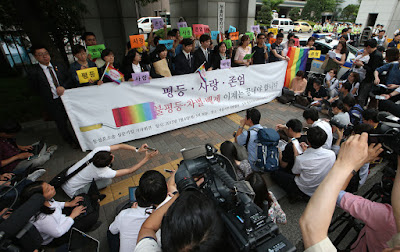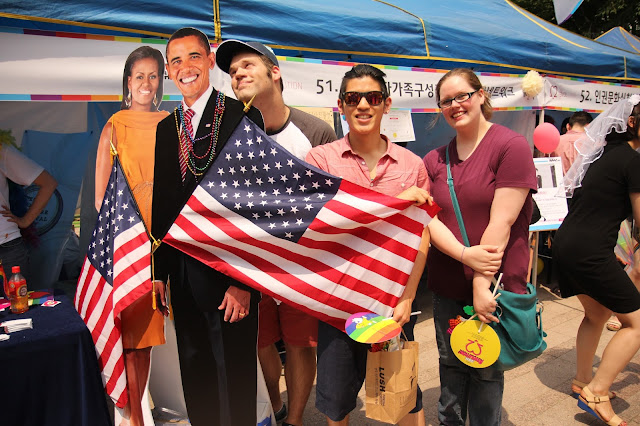Last weekend, I returned to the city that I called home for two years, Changwon. Because I only had a few days to visit, I wanted to meet with as many people as possible, including my host family, friends from church, friends from language class, former colleagues, and even a former student. These were all people who changed my life in some way or another during my time in Korea, so I was very happy to meet them again. Happy is actually an understatement: from the moment I stepped off the train and saw my city with my own eyes once more, I felt a deep contentment and familiarity that must have come from a different level than the one that produces such fleeting emotions as happiness.
The familiarity was a curious feeling, too. From things as simple as getting on one of the city's
insane buses again and remembering my old route home, to moments of reconnection like catching up on my host brother's now-terrifyingly enormous insect collection, to joyous reunions with old friends that included meeting new ones, every moment was tied to something or someone I'd known well all of eleven months ago. As quite a few people remarked, it was as if I'd only left yesterday. I think one year is not really that long a period of time, and most people did not visibly change (with the exception of my taekgyeon master's son, who is now in his terrible twos!). So it was indeed easy to kind of fall back into the swing of things. Except that never in my two years in Changwon did I have such a whirlwind of a weekend, consisting of reunions with dozens of different people.
 |
| Selfies galore, with: Eunjin, the CSHS English department, a former student, my taekgyeon masters, and a Fulbright buddy! |
So here's what happened in detail. I took the KTX high-speed rail down to Changwon on Friday after class, and arrived in the evening in time to get dinner with Victoria, a fellow volunteer for
Changwonderful, at TGI Friday's (how appropriate). Later that evening, I reunited with my taekgyeon 관장님 (
gwanjangnim) and 사범님 (
sabeomnim), the director and master/trainer at my old martial arts gym, and did the whole Korean drink-and-eat-and-drink-some-more thing. I had a wonderful time with them, and also discovered the greatness of flavored soju! I really cherished the opportunity to catch up with 관장님 and 사범님, because aside from people at school and my host family, I spent more time with them than anyone else in Korea. (관장님 even let me crash at his house over the weekend, and I spent a lot of time playing with his young son. 관장님 is like a big brother to me; I love his family and owe them so much.)
But even better, through my broken Korean, I was able to relate to the both of them some of my concerns about graduate school or about life in general, and they gave me some much-needed advice. You see, I often have doubts about my decision to continue in academia, partly because it's so hard and partly because I wonder if I'm actually doing anything meaningful with my life. I'm quick to point out that even though I am grateful to be back in California, I was actually happier on a day-to-day basis when I lived and worked in Korea. But 관장님 said something that reminded me of what many of my friends advised back when I was initially deciding on grad school: that I had to leave Korea to move on with my life.
I guess I don't like to be so blunt about it, but either way, since I've turned the page on that chapter, it's no use trying to go back to it as if I haven't already started the next one. I was also touched when 사범님 told me, or perhaps admitted to me, that in his many years of training in taekgyeon, he never worked so hard or enjoyed it so much as when I attended the gym. Heh, that definitely could have been the
순하리 talking, but I appreciated it nonetheless.
On Saturday, I joined 관장님 for his Saturday youth sports classes, including soccer, jump rope, and dodgeball. I met up with my old language partner Eunjin for lunch in the Garosu-gil area, and we had a great time catching up and discussing everything from our past baking adventures to movies staring 빵형 (aka Brad Pitt... brownie points if you get the joke!). I am so grateful that even though Eunjin's English is better than my Korean, she is always patient with me and will let me struggle through an explanation of how the book and movie versions of
World War Z are completely different but good in their own ways without embarrassing me at all. And in the evening, I had dinner with my host family (I lived with them for my first year of Fulbright) and caught up on old times. Their dogs are still
super cute and super annoying.
On Sunday, I met up with one of my former students, JW, who is now in his second year of university! He contacted me on Facebook and said that he was going home to Changwon, so he wanted to meet up. I was thrilled, because I don't have many opportunities to meet former students, especially those who don't currently live in Seoul. JW really wanted to practice his English, and I felt just like I was back in school doing lunchtime conversation club again. Except this time JW was really eager to talk about university life, and he asked for American TV show recommendations.
I also got lunch with Courtney, who is the Fulbright teacher who has taught at CSHS for the past year, and we discussed life in Korea and the ways she's grown and learned this past year. We also talked about religion and sexuality. I am so impressed with the way Courtney's mind works. It's wide open and ready to listen to anything and everything, as if everyone she encounters is a vendor giving out samples of food she's never seen or tasted before, and it is all delicious. She has embraced the differences of others, as well as the discomfort and the weirdness of living in a foreign country, far from home for a year, with as much energy as a kid at an amusement park who might not be tall enough to get on all of the rides but doesn't care a bit.
In the afternoon, I went back to
Redeemer Changwon, a small church that meets at a cafe in the downtown area. I began going to the church a year ago when it was just a handful of friends wanting a fresh, community-based church experience. I was happy and encouraged to see how it's grown since then. And my old friend Traylor gave the sermon, too! Good on him. He preached from 1 John, which, curiously, is a book that I've heard quite a few sermons on in the past few months. It can't be pure coincidence... It was great to catch up with the church folks again, and meet some new friends. We all went to dinner together afterward at El Loco, an excellent Mexican restaurant with prices much more reasonable compared to here in Seoul.
Monday was the long-awaited day in which I went to visit the school where I taught for two years. As soon as I walked on campus, I felt really... in place. As if it were just any other school day and that I should probably get to my classroom or office in a minute. It was exciting to bump into old teachers and students and see them do a double-take. Many of them stopped to greet me and chat in Korean, and they kept saying, "어떻게 왔어요?" Those two words literally mean
how and
came, so I interpreted it as, "How did you come here?" So I told them that I took a train. To my embarrassment, it's actually, "How
come you
came here?" So I modified my answers: "I'm here to visit." And to reconnect. And to relive some amazing memories.
Courtney was gracious enough to let me visit her classes that day, including her two classes with the third-year students, who were my second-years last year. I was excited to see them, and they were excited to see me, and they kept commenting about my hair, so I told them about topknots and 상투 and they vacillated between thinking it was cool and thinking it was horrible. Yet for all the thrill of the reunion, let's be honest: it was still English class, and they were still pretty loathe to speak English! Not
that much has changed, I suppose! It was actually a bit sad to see how these third-years seemed so tired after so much time stuck in the grueling high school routine. I am looking forward on their behalf to four or five months from now, when they will have finally finished. I also got to meet and play a game with a class of first-years, i.e. students who had no idea who I was. That was a riot, too! They are just the same as my old classes of energetic, not-yet-jaded first-years. They associate California with beaches and CalTech, wail when I tell them that I don't have a girlfriend (and don't want one), and think that my being able to write a few words in
hangul on the board is worthy of infinite admiration.
Besides visiting students, I also got lunch with Courtney and the other English teachers, Saerona, JJ, and a new teacher I hadn't met before. It was so sweet of them to be so welcoming and hospitable. Saerona also made me a small gift. (I'd brought some chocolate from the US, but I wish I'd brought the San Francisco coffee again, as I did once, because the teachers in the main office still remembered how good it was... haha.)
And then, too soon, the day was over, and I got on a bus to go back to Seoul. After seventy-two hours, my heart was full.
- - -
I really want to go back to Changwon again, but I don't really know how feasible that will be, as my schedule gets busier and busier, and the time I have left in Korea is already winding down. I wanted to write more about this fantastic, nostalgic, much-needed weekend. Every meal and every conversation deserves its own post, actually. But most of it wouldn't be of very much interest to anyone but myself. I've just spewed out a lot of words on the Internet about something that is very inconsequential to the world at large... what's the point. Well, if there's anything you take from the post, I hope it's this:
there was nothing that I loved in Korea more than the people that I met here and formed positive relationships with, and they are the only thing that will keep me coming back.








































